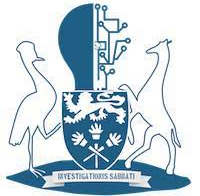CALL FOR ABSTRACTS The national, regional and international experiences of the recent past including the pandemic and economic woes afflicting humanity necessities the need for research to urgently contribute to societal resilience and sustainability of all spheres which support welfare and ensure a brighter future. Measurable socio-economic development and attainment of MDGs remains an elusive dream until new knowledge translates into resilient socio-economic welfare support systems. We must learn how to do things much better, to thrive and increase our safety nets during good times and able to sail through difficulties of the future. There are many recent experiences pointing to us that we must make a paradigm shift to sail through challenges. We need to appraise how our utilization science and research outputs may guide in the application of knowledge for resilience and sustainability. Are we upholding good scientific disciplines, for example scientific leadership, championing innovativeness in research, applicability and working towards legacy to the benefit of present and future generations? Addressing these issues should be the core focus of your papers, posters and exhibitions which you are invited to present during the Faculty of Science and Technology Research Week 2024 conference. Theme “Harnessing Science and Technology for Resilience and Sustainability of Communities” The Conference will run for three days 30 October – 1st November, 2024 with an overall theme “Harnessing Research for Resilience and Sustainability”. Abstracts are invited under this overall theme and/or following sub-themes:
- Science, Technology and Innovation in Industry for Sustainable Socio-Economic Transformation:
- Start-Ups, SMEs; MSMEs and Spin-offs
- Science, technology and innovation for value addition and job creation
- Natural and artificial raw materials in industry
- Biotechnology and nanotechnology
- Statistical Quality control and acceptance sampling in industry
- Automation for improved industry
- Alternative sources of energy for development
- Science- Investment Partnerships for Training and Technology Transfer
- Climate Change Mitigation and Environmental Conservation
- Accelerating Sustainable Universal Health Care through Advances in Scientific Research, Technology and Innovation:
- Water, Sanitation and Hygiene (WASH) technologies.
- Emerging viral, bacterial and societal diseases
- Improved diagnostic techniques
- Actuarial models for health insurance
- Models for disease prediction
- Geo-environment and health
- Advances in management and disposal of hazardous wastes
- Promoting Collaborative Scientific Research, Technology and Innovation for Sustainable Utilization of Natural Products:
- Advances in bio-materials for construction, fuel and biochemical production
- Green-housing technologies
- Indigenous knowledge, Traditional Health systems and natural products
- Pharmacology and bio-prospecting
- Sustainable environmental resource utilization
- Biofuels and alternative energy sources versus food security
- Renewable energy sources
- Natural products in drug discovery
- Natural product chemistry – biology
- Patenting
- Climate change and natural product
- Scientific Research, Technology and Innovations for Sustainable Food Production
- Insects for food and feed
- Microorganisms in food production enhancement
- Advances in crop protection
- Monitoring, Early Warning Systems for Agriculture and Livestock
- Genetically Modified Foods and Crops
- Water for Food Security
- Rocks for Crops
- Smart farming
- Alternative food sources for enhanced food security
- Climate Change and Smart Agriculture
- Management of Emerging Calamities, Diseases and Pests
- Pest control – Locust, army worm, maize virus etc.
- Predicting and managing emerging and chronic calamities such as flooding and drought.
- Models for prediction of agricultural pest invasions.
- Control /management of emerging human diseases.
- Research Outputs and Applications from the Basic Sciences and Practices:
- Mathematics (Biostatistics, Algebraic Geometry, Actuarial Sciences, among others)
- Meteorology
- Geology
- Climate Change
- Chemistry
- Biology
- Computer Science
- Physics
ORIGINAL CONTRIBUTIONS ARE WELCOME. ABSTRACT SUBMISSION GUIDELINES
- Abstracts must be submitted in English.
- Abstracts will be submitted and reviewed under the specified subthemes.
- The title of the presentation must indicate the review subtheme (as listed above) and indicated in brackets.
- Only those abstracts from authors who have registered and paid up the registration fees will be included in the final program.
- Submission of an abstract acknowledges your acceptance for the abstract and the research work to be published in the conference publications.
- Abstracts must be original and must not be or have been published.
- The Conference Committee will determine suitability of abstracts and whether it is accepted as a poster or for oral presentation.
- The lead author will be notified of the abstract status. It is the responsibility of the presenting author to ensure that all co-authors are aware of the contents of the abstract before it is submitted.
- All presenters must submit their full presentations or papers before September 30, 2024.
IMPORTANT DATES
| Abstract submission to close | 30/6/2024 |
| Abstract acceptance notification | 31/7/2024 |
| Full paper submission | 31/8/2024 |
| Registration for conference starts 1/9/2024 | 1/9/2024 |
| Registration for Closes | 30/9/2024 |
CONFERENCE REGISTRATION FEES: Registration: KSH 1000. ABSTRACT PREPARATION Abstract must bear the title, name of presenting author and co-authors, their affiliation details and the email of the presenting author. Abstract title should be limited to 25 words and in UPPER CASE. Abstract text must be limited to 300 words or less. We recommend using word-processing software (for example, Ms Word) for editing your abstract and counting the number of words. Abstracts should include the following information: Background and aims, Methods, Key Results, Conclusions with indication of how work can help to overcome real life challenges and lead to better practices for improved society. It is strongly encouraged that abstracts and papers are aligned with any one of the above themes.

